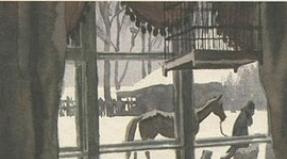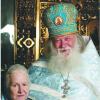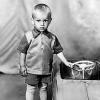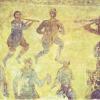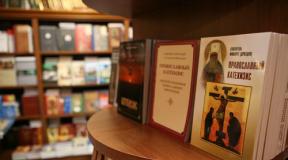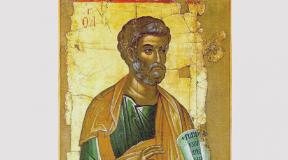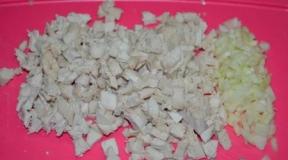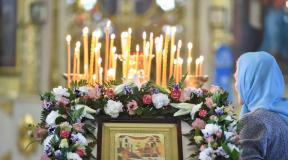Russian everyday tales. Smart girl Smart girl everyday fairy tale
There lived one padishah. He had an only son named Abdul.
The son of the padishah was very stupid and this caused his father a lot of trouble and grief. Padishah hired Abdula wise mentors, sent him to study in distant countries, but nothing helped the stupid son. Once a man came to the padishah and said to him: I want to help you with advice. Find a wife for your son so that she can solve any wise riddles. It will be easier for him to live with an intelligent wife.
The padishah agreed with him and began to look for a wise wife for his son. An old man lived in this country. He had a daughter named Magfura. She helped her father in every way, and the fame of her beauty and intelligence went everywhere for a long time. And although Magfura was the daughter of a common man, the padishah sent his viziers to her father: he decided to be convinced of Magfura's wisdom and ordered her father to be brought to the palace.
An old man came, bowed to the padishah and asked:
I appeared at your command, great padishah, - what do you order?
Here are thirty yards of linen for you. Let your daughter sew shirts out of it for my entire army and leave it for footcloths, - the padishah tells him.
The old man returned home sad. Magfura came out to meet him and asked:
Why are you so sad, father?
The old man told his daughter about the order of the padishah.
Don't be sad, father. Go to the padishah and tell him - let him first build a palace from one log, where I will sew shirts, and even leave it for firewood, - Magfura answers.
The old man took the log, came to the padishah and said:
My daughter asks you to build a palace out of this log, and even leave firewood for fuel. Complete this task, then Magfura will fulfill yours.
The padishah heard this, marveled at the girl's wisdom, gathered the viziers, and they decided to marry Abdul to Magfur. Magfura did not want to marry the stupid Abdul, but the padishah began to threaten her father with death. They summoned guests from all possessions and celebrated the wedding.
Once the padishah decided to go to his possessions; he took his son with him. They go, they go. The padishah became bored, he decided to test his son and says:
Make the road shorter - something has become boring to me.
Abdul dismounted, took a shovel and started digging a road. The vizier began to laugh at him, and the padishah felt hurt and annoyed that his son could not understand his words. He said to his son:
If by tomorrow morning you can't figure out how to make the road shorter, I will punish you severely.
Abdul returned home sad. Magfura came out to meet him and sews:
Why are you, Abdul, so sad?
And Abdul answers his wife:
My father threatens to punish me if I don’t figure out how to make the road shorter. To this Magfura says:
Do not be sad, this is a small problem. Tomorrow you tell your father this way: in order to shorten the boring road, you need to have conversations with your companion. If the companion is a scientist, you need to tell him what cities there are in the state, what battles were and what commanders distinguished themselves in them. And if the companion is a simple person, then you need to tell him about a different craft, about skilled craftsmen. Then the long journey will seem short to everyone.
The next day, early in the morning, the padishah calls his son to him and asks:
Have you figured out how to make the long journey short?
Abdul answered as his wife had taught him.
The padishah understood that it was Magfura who taught Abdul such an answer. He smiled, but said nothing.
When the padishah grew old and died, instead of him, it was not Abdul the fool that ruled the country, but his wise wife Magfura.
1 - About the baby bus who was afraid of the dark
Donald Bisset 
A fairy tale about how a mother-bus taught her baby-bus not to be afraid of the dark ... About a baby-bus who was afraid of the dark to read Once upon a time there was a baby-bus. He was bright red and lived with his dad and mom in the garage. Every morning …
2 - Three kittens
V.G. Suteev 
A small fairy tale for the little ones about three fidgeting kittens and their funny adventures. Young children love short stories with pictures, which is why Suteev's fairy tales are so popular and loved! Three kittens read Three kittens - black, gray and ...
3 - Hedgehog in the fog
Kozlov S.G. 
The tale of the Hedgehog, how he walked at night and got lost in the fog. He fell into the river, but someone carried him to the bank. It was a magical night! Hedgehog in the fog to read Thirty mosquitoes ran into the clearing and began to play ...
4 - Apple
V.G. Suteev 
A tale about a hedgehog, a hare and a crow, who could not share the last apple among themselves. Everyone wanted to take it for themselves. But the fair bear judged their dispute, and each got a piece of delicacy ... Read the apple It was late ...
5 - About the little mouse from the book
Gianni Rodari 
A small tale about a mouse who lived in a book and decided to jump out of it into the big world. Only he did not know how to speak the language of mice, and only knew a strange bookish language ... Read about a mouse from a book ...
6 - Black whirlpool
Kozlov S.G. 
A tale about a cowardly Hare who was afraid of everyone in the forest. And he was so tired of his fear that he came to the Black Whirlpool. But he taught the Hare to live and not be afraid! Black maelstrom read Once upon a time there was a Hare in ...
7 - About the Hedgehog and the Rabbit A piece of winter
Stuart P. and Riddell K.

The story is about how the Hedgehog, before hibernation, ask the Rabbit to save him a piece of winter until spring. The rabbit rolled up a large lump of snow, wrapped it in leaves and hid it in its hole. About the Hedgehog and the Rabbit Piece ...
8 - About the Hippo, who was afraid of vaccinations
V.G. Suteev 
The tale of a cowardly hippopotamus who escaped from the clinic because he was afraid of vaccinations. And he fell ill with jaundice. Fortunately, he was taken to the hospital and cured. And the hippopotamus became very ashamed of its behavior ... About the hippopotamus, who was afraid ...
Once upon a time there was a king, and he had an only son. The prince grew up by leaps and bounds. The king did not even notice how his son grew up big, handsome and courageous. Only he was, poor thing, with a flaw: stupid as a dark night.
And so the king decided to marry his son. He informed the people that he was looking for a bride for the tsarevich, only, they say, she must be the smartest girl in the whole world. Soon the king learned that a poor man lived in a distant village, whose only daughter was so beautiful and intelligent that she had no equal on earth. Then the king decided to send a messenger to her, to whom he ordered:
- Whenever you find a girl, tell me that I ask her to come to me - not on foot, not on horseback, not by air, not by land, not with a present, not without a present, not undressed or dressed.
Soon a messenger appeared to the girl and conveyed the words of the king. And the girl answered him:
- I understood the words of the king and will come to him as ordered.
The messenger returned to the king and reported:
- I found the girl to whom you sent me. Get ready, the wisest king, for the meeting, she will come without hesitation.
The king pondered for a long time how to meet the guest, and was impatiently awaiting her arrival to see how she would fulfill his command.
And the girl, as soon as the messenger left, thought hard: what to do and how to be, in order to please the king and appear to him as ordered.
She caught the pigeon, tied it in a handkerchief so as not to come to the king without a present. Then she found a net, sewed clothes out of it, sat astride a lame hare and set off.
Meanwhile, the king and his courtiers went out on the road to meet the bride. But suddenly they see: a strange stuffed animal is moving towards the kingdom, neither a man nor a woman, neither on horseback, nor on foot, nor on the ground, nor by air, nor naked, nor dressed, nor with a present, nor without a present. As the messenger, sent with the order of the king, looked, he immediately recognized in the effigy the very girl whom the king had invited to him.
The girl approached the royal retinue, and her king asked:
- Who are you and where are you keeping your way?
“I am that girl whom your Majesty invited to the royal palace.
The king marveled and asked again:
- Why are you dressed like that?
The girl answers him:
- After all, you yourself told me, your majesty, to appear: neither on horseback, nor on foot, nor by air, nor by land. So I did.
The king looked at her with an inquiring glance and said, even more surprised at her wisdom:
- It's good, it's good that you came like that. What's in your hand?
“I have a present in my hand, as you ordered, Your Majesty. Please receive.
But as soon as the king stretched out his hand to receive the present, the girl untied the handkerchief, and the dove flapped its wings and rushed up into the air.
Then the king asks her:
- What is this present?
“You said so, your majesty,” the girl replied. - Show up neither with a present, nor without a present.
The king was convinced here that the girl was very clever and cunning, and that she appeared exactly as he ordered.
“Let's go into the house and sit down at the table,” he said to the girl.
They entered the house and sat down at the table. While they were eating and drinking, the king said to the girl:
“If you’re so smart, see if you can carry out one more command of mine.” I have an only son whom I want to marry, and if you do as I please, I will marry him to you.
The girl thought and answered:
- Maybe I will carry out your command, your majesty, but let your son come here first, I want to look at him and talk to him.
The king ordered to call his son. Looking at the prince and talking to him, the girl thought to herself that it would only fit to harness him in a cart, and not marry her. And the king says to the girl:
- Dear girl, this is my son. You know my kingdom. All of it will go to him. If you do what I tell you, I will marry you to him.
The king took three spools of thread, gave them to the girl and said:
- Do you see these coils? Make enough clothes from them to be enough for the entire population of the country.
The girl took all three coils and answered the king:
- I can, your majesty, fulfill your command, but I do not have enough of a trifle: I have nothing to work with, I left the instrument at home. Let your Majesty's son make me tools, but from the material that I will give him, and not from what he would like.
Then she tore out three twigs from the broom and handed them to the king, saying:
- For a long time I have been looking for a groom, and how many of them came, no one was to my liking. Well, the son of your majesty, because he is a royal son, will be able to become one, if, of course, he does the job that I will give him.
Since then and to this day, the tsar's son has been making tools and cannot finish the work in any way. Because of this, the girl could not fulfill the king's command. The king grew old and never married his son to a clever girl. And the girl married a poor guy, but smart and hardworking
And the prince is still looking for a bride for himself, but no one wants to marry him, seeing how stupid he is.
Translation: V. KapitsaRead in 35 minutes
Wise answers
A soldier comes home from service, having served twenty-five years. Everyone asks him about the king, but he never saw him in person. The soldier goes to the palace to see the king, and he tests the soldier and makes him various riddles. The soldier answers so intelligently that the king is satisfied. The king sends him to the dungeon and says that he will send thirty geese to him, let the soldier do not fail and be able to pull out of them by a pen. After that, the king summons thirty rich merchants to him and asks them the same riddles as the soldier, but they cannot guess them. The king puts them in prison for this. The soldier teaches the merchants the correct answers to riddles and takes a thousand rubles from each of them. The king again asks the merchants the same questions, and when the merchants answer, he lets them go, and the soldier gives him another thousand rubles for his wit. The soldier returns home and lives richly and happily.
Wise maiden
Two brothers are traveling, one is poor, the other is rich. The poor have a mare, and the rich have a gelding. They stay overnight. At night, the mare brings a foal, and he rolls under the cart of his rich brother. He wakes up in the morning and tells his poor brother that at night his cart gave birth to a foal. The poor brother says that this cannot be, they begin to argue and sue. It comes down to the king. The king summons both brothers to himself and gives them riddles. The rich goes to the godmother for advice, and she teaches him what to answer to the king. And the poor brother tells about the riddles of his seven-year-old daughter, and she tells him the right answers.
The king listens to both brothers, and he only likes the poor man's answers. When the king finds out that the daughter of a poor brother has solved his riddles, he tests her, giving various tasks, and is more and more surprised at her wisdom. Finally, he invites her to his palace, but stipulates that she should come to him neither on foot, nor on a horse, neither naked, nor dressed, nor with a present, nor without a present. The seven-year-old takes off all his clothes, puts on a net, takes a quail in his hands, sits astride a hare and goes to the palace. The king meets her, and she gives him the quail and says that it is her present, but the king does not have time to take the bird, and it flies away. The king talks with the seven-year-old and again becomes convinced of her wisdom. He orders to give the foal to the poor peasant, and takes his seven-year-old daughter to himself. When she grows up, he marries her and she becomes a queen.
Popov worker
Pop hires a farm laborer, sends him to plow on the bitch and gives him a rug of bread. At the same time, he punishes him so that both he and the bitch are fed, and the mat remains intact. The farm laborer works all day, and when hunger becomes unbearable, he thinks out what to do to fulfill the priest's order. He removes the top crust from the rugs, pulls out all the crumb, eats his fill and feeds the bitch, and sticks the crust in place. The priest is pleased that the fellow turned out to be quick-witted, gives him over the agreed price for his ingenuity, and the laborer lives with the priest happily.
Shepherd's daughter
The tsar marries the shepherd's daughter, a beautiful woman, but demands from her that she does not contradict anything, otherwise he will execute her. A son is born to them, but the king tells his wife that it is not good for a peasant's son to take over the whole kingdom after his death, and therefore her son must be killed. The wife resignedly obeys, and the king secretly sends the child to his sister. When they have a daughter, the king does the same with the girl. The prince and the princess grow up away from their mother and become very good-looking.
Many years pass, and the king announces to his wife that he no longer wants to live with her, and sends her back to her father. She does not reproach her husband with a single word and grazes the cattle as before. The king summons his former wife to the palace, tells her that he is going to marry a young beauty, and tells her to clean up the rooms for the arrival of the bride. She arrives, and the king asks his former wife if his bride is good, and the wife humbly replies that if he feels good, then even more so. Then the tsar returns the royal attire to her and confesses that the young beauty is her daughter, and the handsome man who came with her is her son. After that, the king ceases to test his wife and lives with her without any cunning.
Slandered merchant's daughter
The merchant and the merchant's wife have a son and a beautiful daughter. Parents die, and the brother says goodbye to his beloved sister and leaves for military service. They change their portraits and promise to never forget each other. The merchant's son serves the tsar faithfully, becomes a colonel and befriends the tsarevich himself. He sees a portrait of his sister on the wall of the colonel, falls in love with her and dreams of marrying her. All colonels and generals envy the friendship of the merchant's son with the prince and think about how to make them friends.
One envious general goes to the city where the colonel's sister lives, inquires about her and learns that she is a girl of exemplary behavior and rarely leaves home, except to church. On the eve of the big holiday, the general waits for the girl to leave for the all-night vigil, and comes to her house. Taking advantage of the fact that the servants take him for the brother of their mistress, he goes to her bedroom, steals a glove and a name ring from her table and hurries off. The merchant's daughter returns from the church, and the servants tell her that her brother came, did not find her and also went to church. She is waiting for her brother, notices that the gold ring has disappeared, and guesses that a thief has visited the house. And the general arrives in the capital, slanders the prince about the colonel's sister, says that he himself could not resist and sinned with her, and shows her ring and glove, which she allegedly gave him as a keepsake.
The prince tells the merchant's son about everything. He takes leave and goes to his sister. From her, he learns that her ring and glove have disappeared from her bedroom. The merchant's son realizes that all this is the machinations of the general, and asks his sister to come to the capital when there is a big divorce in the square. The girl arrives and asks the prince to try the general who defamed her name. The prince calls the general, but he swears that he sees this girl for the first time. The merchant's daughter shows the general a glove, a pair to the one she allegedly gave the general along with a gold ring, and accuses the general of lying. He confesses everything, he is tried and sentenced to be hanged. And the prince goes to his father, and he allows him to marry a merchant's daughter.
The soldier and the king in the forest
The man has two sons. The senior is taken into recruits, and he is promoted to the rank of general. Then the junior is taken into the soldiers, and he ends up in the same regiment where his brother-general is in command. But the general does not want to recognize his younger brother: he is ashamed that he is a simple soldier, and directly tells him that he does not want to know him. When the soldier tells the general's friends about this, he orders to give him three hundred sticks. The soldier escapes from the regiment and lives alone in a wild forest, feeding on roots and berries.
Once in this forest the king and his retinue are hunting. The king is chasing a deer and lagging behind the rest of the hunters. He wanders in the woods and meets a fugitive soldier. The king tells the soldier that he is the king's servant. They look for a lodging for the night and enter the forest hut in which the old woman lives. She does not want to feed the intruders, but the soldier finds her plenty of food and wine and reproaches her for being greedy. Having eaten and drunk, they go to sleep in the attic, but the soldier, just in case, persuades the king to take turns to stand on the clock. The king falls asleep twice at the post, and the soldier wakes him up, and the third time he beats him up and sends him to sleep, while he himself is on guard.
The robbers come to the hut. They go up to the attic one by one to kill the intruders, but the soldier deals with them. The next morning, the soldier and the king descend from the attic and the soldier demands from the old woman all the money that the robbers have stolen.
The soldier takes the king out of the forest and says goodbye to him, and he invites the servant to the royal palace and promises to plead with the sovereign for him. The tsar gives orders to all outposts: if they see such and such a soldier, let them salute him as it should be to greet a general. The soldier is surprised, comes to the palace and recognizes in his recent comrade the king. He awards him with the rank of general, and breaks his older brother into soldiers so that he does not abandon his family and tribe.
Moroka
The sailor takes time off from the ship to the shore, goes every day to the inn, carousing and pays only in gold. The innkeeper suspects something was wrong and informs the officer, who reports to the general. The general calls the sailor and demands that he explain where he got so much gold from. He replies that there is a lot of such good in any cesspool and asks the innkeeper to show the gold that he received from him. In the box, instead of gold, there are knuckles. Suddenly streams of water rush through the windows and doors, and the general has no time for questions. The sailor offers to climb out through the chimney onto the roof. They escape and see that the whole city is flooded. A skiff is sailing by, a sailor and a general get into it and on the third day they sail to the thirtieth kingdom.
To earn a living, they go to the village and are hired for the whole summer as shepherds: a sailor becomes a senior, and a general becomes a shepherd. In the fall, they are paid money, and the sailor divides them equally, but the general is unhappy with the fact that a simple sailor equals him with himself. They quarrel, but then the sailor pushes the general to wake up. The general comes to his senses and sees that he is in the same room, as if he never left it. He does not want to judge the sailor anymore and lets him go. So the innkeeper is left with nothing.
Witch doctor
A poor and windy peasant called the Bug steals a canvas from a woman, hides it, and he himself boasts that he knows how to bewitch. Baba comes to him to find out where her canvas is. The peasant asks for a pood of flour and a pound of butter for the work and tells where the canvas is hidden.After that, having stolen a stallion from the master, he receives a hundred rubles from the master for fortune-telling, and the peasant is glorified as a great healer.
The king's wedding ring disappears, and he sends for the healer: if the peasant finds out where the ring is, he will receive a reward, if not, he will lose his head. The witch doctor is assigned a special room so that by morning he will know where the ring is. The footman, coachman and cook, who stole the ring, are afraid that the witch doctor will find out about them, and agree to take turns eavesdropping at the door. The man decided to wait for the third roosters and run away. A footman comes to eavesdrop, and at this time the rooster begins to sing for the first time. The man says: one is already there, there are still two to wait! The footman thinks that the witch doctor recognized him. The same thing happens with the coachman and the cook: the roosters are singing, and the man counts and says: there are two! and now all three! The thieves beg the witch doctor not to hand them over and give him the ring. The man throws the ring under the floorboard, and the next morning he tells the king where to look for the loss.
The king generously rewards the medicine man and goes for a walk in the garden. Seeing a beetle, he hides it in his palm, returns to the palace and asks the peasant to guess what is in his hand. The man says to himself: "Well, the tsar got a bug in the hands!" The king rewards the witch doctor even more and lets him go home.
Blind men
In Moscow, at the Kaluzhskaya outpost, a man gives a blind beggar from the last fifty kopecks a seven-dollar bill and asks for forty-eight kopecks for change, but the blind does not seem to hear. The peasant feels sorry for his money, and he, getting angry with the blind man, slowly takes one crutch away from him, and he himself follows him when he leaves. The blind man comes to his hut, opens the door, and the peasant sniffs into the room and hides there. The blind man locks himself from the inside, takes out a barrel of money, pours everything that he has collected in a day, and grins, remembering the fellow who gave him his last fifty dollars. And in a beggar's barrel - five hundred rubles. A blind man with nothing to do rolls the barrel on the floor, it hits the wall and rolls back towards him. The man slowly takes the keg from him. The blind man does not understand where the keg has gone, unlocks the door and calls
Pantelei, his neighbor, who lives in a neighboring hut. He comes.
The peasant sees that Panteley is also blind. Panteley scolds his friend for his stupidity and says that he should not have played with money, but did what Panteley did: exchange money for banknotes and sew them into an old hat, which is always with him. And in it Pantelei - about five hundred rubles. The man quietly takes off his hat, goes out the door and runs away, taking a barrel with him. Panteley thinks that his neighbor has taken off his hat and begins to fight with him. And while the blind men are fighting, the man returns to his home and lives happily ever after.
Thief
The man has three sons. He takes the elder to the forest, the guy sees a birch and says that if he burned it for coal, he would start a smithy for himself and start earning money. The father is pleased that his son is smart. He is taking his middle son to the forest. He sees an oak and says that if this oak were cut down, he would become carpentry and earn money. Father and middle son are satisfied. And no matter how he drove the younger Vanka through the forest, he was silent. They leave the forest, the boy sees a cow and tells his father that it would be nice to steal this cow! The father sees that there will be no use from him, and drives him away. And Vanka becomes such a clever thief that the townspeople complain about him to the king. He calls Vanka to him and wants to test him: is he as smart as they say about him. The king orders him to take the stallion away from him: if Vanka can steal him, then the king will have mercy on him, but if not, he will execute him.
That evening, Vanka pretends to be drunk as an insole and wanders with a keg of vodka through the royal court. The grooms take him to the stable, take the keg from him and get drunk, and Vanka pretends to be asleep. When the grooms fall asleep, the thief takes the royal stallion away. The king forgives Vanka for this trick, but demands that the thief leave his kingdom, otherwise he will not get it!
Dead body
The old widow has two smart sons, and the third is a fool. Dying, the mother asks her sons so that they do not cheat the fool during the division of the property, but the brothers do not give him anything. And the fool grabs the deceased from the table, drags her to the attic and shouts from there that his mother was killed. The brothers do not want a scandal and give him a hundred rubles. The fool puts the deceased in the woods and takes her to the high road. The master gallops towards him, but the fool does not turn off the road on purpose. The master runs into the logs, the deceased falls from them, and the fool yells that mother was killed. The master is frightened and gives him a hundred rubles to keep quiet, but the fool takes three hundred rubles from him. Then the fool slowly takes the deceased to the priest's yard, drags her into the cellar, puts it on the straw, removes the lids from the milk crinkle and gives the dead woman a jug and a spoon. He himself hides behind a tub.
He goes down to the priest's cellar and sees: some old woman sits and collects sour cream from the crinkles into a jug. The butt grabs the stick, hits the old woman on the head, she falls, and the fool jumps out from behind the tub and shouts that mother was killed. A priest comes running, gives the fool a hundred rubles and promises to bury the deceased with his own money, if only the fool is silent. The fool returns home with money. The brothers ask him where he is of the deceased, and he replies that he has sold. So it becomes jealous, they kill their wives and take them to the market to sell, and they are seized and exiled to Siberia. The fool, on the other hand, becomes the master of the house and lives - he does not grieve.
Ivan the Fool
The old man and the old woman have three sons: two are smart, and the third is a fool. His mother sends him to take a pot of dumplings to the brothers in the field. He sees his shadow and thinks that some person is following him and wants to eat dumplings. The fool throws dumplings at him, and he doesn't lag behind. So the fool comes; to brothers with empty hands. They beat the fool, go to the village for dinner, and they leave him to graze the sheep. The fool sees that the sheep have scattered across the field, gathers them in a heap and knocks out the eyes of all the sheep. Brothers come, see what the fool has done, and beat him more than ever.
Old men send Ivanushka to the city for shopping for the holiday. He buys everything he asked for, but out of his stupidity throws everything out of the cart. The brothers beat him again and go shopping themselves, and Ivanushka is left in the hut. Tom doesn't like the beer fermenting in the tub. He doesn’t tell him to wander, but the beer doesn’t listen. The fool gets angry, pours beer on the floor, sits down in the trough and floats around the hut. The brothers return, sew the fool into a sack, carry him to the river and look for an ice hole to drown. The master rides by on three horses, and the fool shouts that he, Ivanushka, does not want to be a voivode, but they force him. The master agrees to become a commander instead of a fool and pulls him out of the cooler, and Ivanushka puts the master in there, sews the sack, sits in the cart and leaves. Brothers come, throw a sack into the ice-hole and go home, and Ivanushka rides towards them in a troika.
The fool tells them that when they threw him into the ice-hole, he caught horses under the water, but there was still a glorious horse. The brothers ask Ivanushka to sew them into a sack and throw them into the hole. He does so, and then goes home to drink beer and commemorate the brothers.
Lutonyushka
Their son Lutonya lives with an old man and an old woman. Once the old woman drops a log and begins to lament, and tells her husband that if they had married their Lutonya, and had a son and sat next to her, she would have knocked him to death by dropping the log. The old people sit and cry bitterly. Lutonya finds out what the matter is, and leaves the yard - to look if there is anyone in the world more stupid than his parents. In the village, the peasants want to drag a cow onto the roof of the hut. When asked by Lutoni, they say that a lot of grass has grown there. Lutonya climbs onto the roof, picks off several bundles and throws it to the cow.
The men are surprised at Lutoni's resourcefulness and beg him to live with them, but he refuses. In another village, he sees that the peasants have tied a yoke at the gate and drive a horse into it with sticks. Lutonya puts a collar on the horse and moves on. At the inn, the hostess puts salamata on the table, and she endlessly walks with a spoon to the cellar for sour cream. Lutonya explains to her that it is easier to bring a jug of sour cream from the cellar and put it on the table. The hostess thanks Lutonya and treats him to her.
Mena
A peasant finds oatmeal in the manure, asks his wife to pound it, grind it, cook jelly and pour it into a dish, and he will take it to the king: maybe the king will grant something! A man comes to the king with a dish of jelly, and he gives him a golden grater. A man goes home, meets a shepherd on the way, exchanges a grouse for a horse and moves on. Then he exchanges a horse for a cow, a cow for a sheep, a sheep for a pig, a pig for a goose, a goose for a duck, a duck for a club. He comes home and tells his wife what reward he received from the king and what he exchanged for it. The wife grabs the club and pounds her husband.
Ivan the Fool
The old man and the old woman have two sons, married and hard-working, and the third, Ivan the Fool, is single and loafing around. They send Ivan the Fool into the field, he whips the horse on the side, kills forty horseflies in one fell swoop, and it seems to him that he has killed forty heroes. He comes home and demands a curtain, a saddle, a horse and a saber from his family. Those laugh at him and give away what is useless, and the fool sits on a thin mare and leaves. He writes on a post a message to Ilya Muromets and Fyodor Lyzhnikov, so that they come to him, a strong and mighty hero, who killed forty heroes in one fell swoop.
Ilya Muromets and Fyodor Lyzhnikov see the message of Ivan, a mighty hero, and join him. The three of them come to a certain state and stop at the royal meadows. Ivan the Fool demands that the Tsar give him his daughter as a wife. The angry tsar orders the capture of three heroes, but Ilya Muromets and Fyodor Lyzhnikov disperse the tsar's army. The Tsar sends for the hero Dobrynya, who lives in his domain. Ilya Muromets and Fyodor Lyzhnikov see that Dobrynya himself is coming to them, get scared and run away, and Ivan the Fool does not have time to get on the horse. Dobrynya is so tall that he has to bend into three deaths in order to properly examine Ivan. He, without thinking twice, grabs a saber and cuts off the hero's head. The Tsar is frightened and gives his daughter for Ivan.
The tale of the wicked wife
The wife does not obey her husband and will reread him in everything. Not life, but torment! The husband goes into the forest for berries and sees a bottomless pit in the currant bush. He comes home and tells his wife not to go to the forest for berries, and she goes to spite him. The husband takes her to a currant bush and tells her not to pick the berries, and she tears out of spite, climbs into the middle of the bush and falls into the hole. The husband rejoices and after a few days goes to the forest to visit his wife. He lowers a long cord into the hole, pulls it out, and on it is a devil! The man is frightened and wants to throw him back into the pit, but he asks to let him go, promises to repay him with kindness and says that an evil wife came to them and that all the devils from her were gone.
A man with an imp agree that one will starve, and the other will treat, and they come to Vologda. The imp stabs the merchants' wives and daughters, and they get sick, and the peasant, as soon as he comes to the house where the imp has settled, is so unclean from there. The peasant is mistaken for a doctor and gives a lot of money. Finally, the imp tells him that now the man has become rich and they are with him in the calculation. He warns the peasant not to go to heal the boyar's daughter, into which he, unclean, will soon enter. But the boyar, when his daughter falls ill, persuades the peasant to heal her.
A man comes to the boyar and orders all the townspeople to stand in front of the house and shout that the wicked wife has come. The imp sees the man, gets angry with him and threatens to eat him, but he says that he came out of friendship - to warn the imp that an evil wife has come here. The imp is frightened, hears everyone on the street shouting about it, and does not know where to go. The man advises him to return to the pit, the devil jumps there and there with the evil wife and remains. And the boyar gives his daughter for the peasant and gives half of his estate for her.
Arguing wife
A man lives and suffers, because his wife is a stubborn, quarrelsome and inveterate disputant. When someone's cattle wanders into the yard, God forbid to say that the cattle is someone else's, we must say that hers! The man does not know how to get rid of such a wife. Once the lord's geese come to their yard. The wife asks her husband whose they are. He answers: lordly. The wife, flushed with anger, falls to the floor and shouts: I am dying! say, whose geese? The husband answered her again: lordly! Wife is really bad, she moans and groans, calls the priest, but does not stop asking about the geese. A priest arrives, confesses and communes her, his wife asks to prepare a coffin for her, but again asks her husband whose geese are. He again tells her that they are lordly. The coffin is taken to church, a memorial service is served, the husband comes up to the coffin to say goodbye, and the wife whispers to him: whose geese? The husband replies that they are lordly, and orders that the coffin be carried to the cemetery. They lower the coffin into the grave, the husband leans over to his wife, and she whispers again: whose geese? He answers her: lordly! They cover the grave with earth. This is how the grandmother's geese left!
The Wife of the Witness
An old man lives with an old woman, and she is so talkative that the old man gets it all the time because of her language. The old man goes into the forest for firewood and finds a cauldron full of gold. He is glad to be rich, but does not know how to bring it home: his wife will immediately blab it to everyone! He comes up with a trick: he buries the cauldron in the ground, goes to the city, buys a pike and a live hare. He hangs the pike on a tree, and carries the hare to the river and puts it in a net. At home, he tells the old woman about the treasure and goes with her into the forest. On the way, the old woman sees a pike on the tree, and the old man takes it off. Then he goes with the old woman to the river and with her pulls a hare out of the fishing net. They come to the forest, dig up the treasure and go home. On the way, the old woman tells the old man that she can hear the cows roaring, and he answers that it is their master's devils who are tearing up.
They now live richly, but the old woman has completely gotten out of her hands: every day she throws feasts, even if you run out of the house! The old man suffers, but then beats her hard. She runs to the master, tells him about the treasure and asks him to take the old man to Siberia. The master gets angry, comes to the old man and demands that he confess everything. But the old man swears to him that he did not find any treasure on the land of the lord. The old woman shows where the old man is hiding money, but the chest is empty. Then she tells the master how they went to the forest for the treasure, on the way they took a pike from the tree, then they pulled a hare out of the fishing net, and when they returned, they heard how the devils were tearing him up, master. The master sees that the old woman is out of her mind and drives her away. Soon she dies, and the old man marries the young and lives happily ever after.
Prophetic oak
The good old man has a young wife, a cheating woman. Almost not according to her, she does not feed him, and does nothing around the house. He wants to teach her a lesson. He comes from the forest and says that there is an old oak tree that knows everything and predicts the future. The wife hurries to the oak, and the old man comes before her and hides in a hollow. The wife asks the oak for advice on how to blind her old and unloved husband. And the old man from the hollow replies to her that it is necessary to feed him better, and he will go blind. The wife tries to feed the old man sweeter, and after a while he pretends to be blind. The wife rejoices, calls the guests, they have a feast in the mountains. There is not enough wine, and the wife leaves the hut to bring more wine. The old man sees that the guests are drunk, and he kills them one by one, and plugs his mouth with pancakes, as if they choked. The wife comes, sees that all the friends are dead, and henceforth swears to invite guests. A fool walks past, his wife gives him a gold piece, and he pulls out the dead: whom he throws into the hole, whom he covers with mud.
Dear skin
Two brothers live. Danilo is rich, but envious, and poor Gavrila only has an estate, that one cow Danilo comes to his brother and says that nowadays cows are cheap in the city, for six rubles, and they give twenty-five for a skin. Tavrilo, believing him, slaughters the cow, the meat eats, and the skin is brought to the market. But no one gives him more than two and a half. Finally Tavrilo gives up the skin to a merchant and asks him to treat him with vodka. The merchant gives him his handkerchief and tells him to go to his house, give the handkerchief to the hostess and tell her to bring a glass of wine.
Tavrilo comes to the merchant's wife, and she has a lover. The merchant's wife treats Gavrila to wine, but he still does not leave and asks for more. The merchant returns, his wife hurries to hide her lover, and Tavrilo hides in a trap with him. The owner brings guests with him, they start drinking and singing songs. Gavrila also wants to sing, but the merchant's lover discourages him and gives for it first one hundred rubles, then two hundred more. The merchant's wife hears them whispering in the trap, and brings Gavrila another five hundred rubles, just to keep quiet. Tavrilo finds a pillow and a keg of resin, tells the merchant's lover to undress, dumps it in resin, dumps it in feathers, sits on top of it, and screams out of the trap. The guests think they are devils and run away. The merchant's wife tells her husband that she has noticed for a long time that evil spirits are playing pranks in their house, he believes her and sells the house for a pittance. And Tavrilo returns home and sends his eldest son for Uncle Danil to help him count the money. He wonders where the poor brother got so much money, and Tavrilo says that he helped out twenty-five rubles for cowhide, bought more cows with this money, ripped off their skins, and sold them again, and put the money into circulation again.
The greedy and envious Danilo stabs all his cattle and takes the skins to the market, but no one gives him more than two and a half. Danilo remains at a loss and now lives poorer than his brother, and Tavrilo is making great wealth.
How a husband weaned his wife from fairy tales
The janitor's wife loves fairy tales so much that she does not let those who do not know how to tell them to stay. And the husband from this loss, he thinks: how to wean her from fairy tales! The man asks to spend the night on a cold night and promises to tell fairy tales all night long, if only they let him into the warmth, but he himself does not know a single one. The husband tells his wife that the man will speak on one condition: that she should not interrupt him. The peasant begins: an owl flew past the garden, sat down on a block, drank water ... Yes, that's just what he says. The wife is bored of listening to the same thing, she gets angry and interrupts the peasant, but that is all the husband needs. He jumps up from the bench and begins to beat his wife for interrupting the narrator and not letting the tale be heard. And so she gets from him that since then she has renounced listening to fairy tales.
Miser
The rich but stingy merchant Marko sees how the poor man takes pity on the beggar and gives him a pretty penny. The merchant becomes ashamed, he asks the peasant for a pretty penny and tells him that he has no small money, but he also wants to give to the beggar. He gives Marco a pretty penny and comes for a debt, but the merchant sends him every time: they say, there is no small money! When he again comes for a pretty penny, Marco asks his wife to tell the peasant that her husband is dead, and he strips naked, covers himself with a sheet and lies under the image. And the peasant offers the merchant's wife to wash the deceased, takes cast iron with hot water and let the merchant water it. He suffers.
After washing Marko, the poor man puts him in a coffin and goes with the deceased to the church to read the psalter over him. At night, robbers enter the church, and the man hides behind the altar. The robbers begin to divide the booty, but they cannot divide the golden saber among themselves: everyone wants to take it for themselves. The poor man runs out from behind the altar and shouts that the saber will get to the one who chops off the dead man's head. Marco jumps up, and the thieves throw their spoils and scatter in fear.
Marko and the man share all the money equally, and when the man asks about his pretty penny, Marco tells him that again he has no small ones with him. So he does not give a pretty penny.
* * *
The peasant has a big family, and for good - one goose. When there is absolutely nothing to eat, the peasant roasts a goose, but there is nothing to eat it with: there is no bread or salt. A man consults with his wife and takes the goose to the master to bow in order to ask him for bread. He asks the peasant to share the goose, so much so that everyone in the family will have enough. And the master has a wife, two sons and two daughters. The man divides the goose in such a way that he gets most of it. The master likes the peasant's ingenuity, and he treats the peasant with wine and gives him bread. The rich and envious peasant learns about this and also goes to the master, having roasted five geese. The master asks him to be divided equally among all, but he cannot. The master sends for a poor man to share the geese. He gives one goose to the gentleman and the lady, one to their sons, one to their daughters and takes two geese for himself. The master praises the peasant for his resourcefulness, rewards him with money, and kicks out the rich peasant.
* * *
A soldier comes to the hostess's apartment and asks for food, but the hostess is stingy and says that she has nothing. Then the soldier tells her that he will cook porridge from one ax. He takes an ax from a woman, cooks it, then asks to add cereals, butter - the porridge is ready.
They eat the porridge, and the woman asks the soldier when they will eat the ax, and the soldier replies that the ax has not been cooked yet and he will cook it up and have breakfast somewhere along the way. The soldier hides the ax and leaves satisfied and satisfied.
* * *
An old man and an old woman are sitting on the stove, and she says that if they had children, the son would plow the field and sow bread, and the daughter would drown him, and she herself, the old woman, would brew beer and call all her relatives, and would not call the old man's relatives. Older demands that she call his relatives, and not call her own. They quarrel, and the old man drags the old woman by the scythe and pushes her off the stove. When he goes into the forest for firewood, the old woman is about to run away from the house. She bakes pies, puts them in a large bag and goes to a neighbor to say goodbye.
The old man finds out that the old woman is going to run away from him, takes pies out of the bag and climbs into it himself. The old woman takes the bag and walks. After walking a little, she wants to stop and says that it would be nice now to sit on a stump and eat a pie, and the old man from the bag shouts that he sees and hears everything. The old woman is afraid that he will catch up with her, and again sets off on the road. So the old man does not give the old woman a rest. When she can no longer walk and unties the sack to refresh herself, she sees that the old man is sitting in the sack. She asks to forgive her and promises not to run away from him anymore. The old man forgives her, and they return home together.
* * *
Ivan sends his wife Arina to harvest rye in the field. And she reaps just enough to have a place to lie down and fall asleep. At home, she tells her husband that she squeezed out one place, and he thinks that the whole strip is over. And this is repeated every time. Finally, Ivan goes to the field for the sheaves, sees that all the rye is uncompressed, only a few places have been squeezed out.
In one such place Arina lies and sleeps. Ivan thinks to teach his wife a lesson: he takes scissors, cuts her bald, smears her head with molasses and sprinkles it with fluff, and then goes home. Arina wakes up, touches her head with her hand and does not understand in any way: either she is not Arina, or the head is not hers. She comes to her hut and asks under the window if Arina is at home. And the husband answers that the wife is at home. The dog does not recognize the owner and rushes at her, she runs away and wanders around the field without eating for the whole day. Finally Ivan forgives her and returns home. Since then, Arina is no longer lazy, does not cheat and works conscientiously.
* * *
A man plows in the field, finds a semi-precious stone and brings it to the king. A man comes to the palace and asks the general to bring him to the king. For the service, he demands from the peasant half of what the king will reward him with. The man agrees, and the general brings him to the king. The king is pleased with the stone and gives the peasant two thousand rubles, but he does not want money and asks for fifty lashes with a whip. The tsar takes pity on the peasant and orders him to be lashed off, but very lightly. Mrkik counts the blows and, having counted twenty-five, tells the king that the other half is to the one who brought him here. The king summons the general, and he gets what is due to him in full. And the tsar gives the peasant three thousand rubles.
Retold
Once the shah and his vizier were returning from a hunt and saw that a hunched-over old woman was walking ahead. The shah bridled his horse, overtook her and asked:
- Hey, old woman, who are you and what are you doing here?
“I’m a woman, don’t you see?” - answered the old woman. - And I am engaged in spoiling life for some, making others happy.
Shah was surprised:
- What power do you have so that you can make someone happy or unhappy?
“O shah,” the old woman laughed, “don't you know what a woman is capable of? If a woman doesn't destroy the house, it will stand for a thousand years.
Shah did not like the old woman's words. And the vizier agreed with her.
Already the old woman had long been left behind, and they all argued, And even in the palace they continued to bicker. The padishah had three daughters. He called them to settle the dispute.
- Daughters, - he asked, - who is building the house - a woman or a man?
The eldest daughter replied:
- Of course, husband.
Shah liked her answer.
- Thank you, daughter, you're right, - he said and turned to his middle daughter: - What do you say? She replied:
- Father, what is a woman so that she can build a house? Of course, a man builds a house.
The shah turned to his youngest daughter:
- What do you think, daughter? But the youngest daughter disappointed him:
- Father, a woman is building a house.
The Shah was an unrestrained person. In anger, he jumped up from the throne.
“If so, I will marry you to a poor homeless man. Let's see how you build a house!
And I must say, on the outskirts of this city, an old woman, Fata-gara, lived in a pitiful shack. And she had a grandson, Ahmed, so lazy that he was ready not to drink, not eat, just not to get up. The shah called this Faty-gary to him and said: - Listen, old woman, I give my youngest daughter for your grandson. And since you are a poor man and you have nothing, you don’t need a wedding; without any music, take it with you when you go home.
The old woman fell at his feet in horror:
- O shah, what kind of couple is my grandson of your daughter? He doesn't even wear decent clothes. He walks in such rags that the poor are frightened. Yes, he never ate bread in his life. How can he support the Shah's daughter? No, great shah, don't do that.
“It’s none of your wits,” the shah said angrily. - It has been said - I give my daughter for your grandson - and it's over.
The old woman had no choice but to do, and she, taking the Shah's daughter with her, went home. There she told her grandson about everything. Although Ahmed was amazed at the Shah's unexpected decision, he did not get out of bed.
And the Shah's daughter was very smart and cunning. She was not in the least afraid of her father's anger, nor the unexpected marriage. She decided that she would deal with her husband's laziness.
First of all, she noticed that he was due to Lena. eating in bed. Therefore, on the very first day, she set the table and invited Ahmed to eat .. He begged her for a long time to bring dinner to bed. But she didn’t agree. Then Ahmed turned to the wall and fell asleep. - The next day the same thing happened again. Ahtmed felt that he was hungry, the young man realized that no one would give him food in bed, even if he died, and somehow, groaning and groaning, crawled to the set table. After eating, he immediately fell asleep. And every day my wife laid the table farther from the bed. A few days later, Ahmed would get up, as soon as she brought in food. Then she began to serve dinner in the yard on the green grass. Ahmed began to come here too, but after eating, he invariably went to bed.
Once the Shah's daughter decided to lure him out into the street. She learned that her husband loves nuts. Having bought two pounds of nuts at the market, she scattered them from the gate to the house and said:
- Ahmed, stop keeping the sides. There are nuts lying around in the yard, get up, pick them up and eat them.
Although Ahmed was too lazy to get up, he wanted even more nuts. He got out of bed, somehow collected the nuts at the gate and went to bed again. The next day she came up with a new trick, then another, and so gradually she taught the lazy person to go out into the street. Then she began to send him to the market.
But Ahmed objected:
- Yes, I do not know how to do anything, where can I find a job?
- You just go out into the street, - said the wife, - shout who needs a worker, and you will see that someone will need it. But whoever comes up to you, do not bargain and do not argue, go with him. He will give you a job.
Somehow she took Ahmed out into the street. He stood in the middle of the road, barely audibly repeating:
- Who needs an employee?
Suddenly a man came up to him and said:
- Son, I have a garden, go dig up the earth, for this I have given you one tumen.
Ahmed was about to refuse, but remembered the words of his wife and went. Until evening he dug in the garden, and in the evening he received a bribe and went home.
On the way, he saw that a man was selling a cat. He gave his tumen for the cat. At home, the Shah's daughter asked:
- Ahmed, what did you do, how much did you earn?
“I earned one tumen,” he replied, “but I gave it for this cat.
His wife did not scold him, she just said:
- Once you tried to work, go on a long journey. You need to take a walk, see new places. Ahmed again became lazy, he tried to argue.
- How can I travel, because I have no horse, no money, and I don’t know the road.
But the Shah's daughter was persistent:
- Tomorrow you will go to the market, stand on the side of the road and wait. A caravan of camels will pass by you. If you ask the owner to take you and say that you will help him for this, he will agree. So you will go with them.
Ahmed knew that his wife would get what she wanted anyway, whatever she said, it would be, and therefore agreed. Morning has come. He went to the road and stood on the side of the road. Indeed, a line of camels soon appeared. Ahmed approached the owner of the caravan and asked:
- Won't you take me with you, kind person? For this I will help you on the road.
- Of course, I'll take it, I'm looking for such a person in the afternoon with fire. I was looking in the sky, I got it on the ground. So Ahmed went to wander. Their path lay through the desert, and in the very middle of it they ran out of water. How long, how little they walked, languishing with thirst, finally reached the well.
The owner of the caravan called Ahmed and said to him:
- Sonny, we will lower you down the well, get some water.
Ahmed is already used to agreeing with everything, and he agreed to that too. They tied him with a rope, lowered him into the well. Ahmed stood with his feet to the bottom, looked around and saw: there were no walls around, no light. Only a piece of the sun shines from above. He walked for a long time until he came across a river. He took two water skins and came back. He began to call to take him upstairs. But instead of an answer, there was a terrible roar and the divas appeared. Ahmed was frightened, wanted to run away, but nowhere. Divus blocked the passages in all directions with his hands, and it was impossible to climb up. And roared:
“O son of man, I see you want to run away from me. But know, you will not run away from me anywhere. Not a single living creature got here. But you're in luck. Today I am in a good mood. Now I'm going to ask you a question. If you tell the truth, you are saved, but if you do not, I will tear you to pieces.
And, taking Ahmed with him, the div went to his palace. This palace was so beautiful that Ahmed's eyes flickered. Everything was buried in gold and precious stones. Div began to lead Ahmed around the rooms. In this way they passed thirty-nine rooms. And in the fortieth room, stopping in front of a golden tray with a frog, the divas asked:
- O son of man, tell me now what is the most beautiful thing in the world?
Ahmed replied:
- The most beautiful thing in the world is that which loves your soul.
The diva really liked these words, because he was in love with this very frog. And he changed his mind to kill Ahmed. And pa-turnover, gave him a pomegranate, a large nut and set him free. Ahmed reached the well, but no matter how much he called, no one answered, because the caravan left long ago. And I must say that, going on this journey, Ahmed took with him a cat, which he bought for tumen. When the caravan moved on, the cat did not go with them, it remained to wait for the owner at the well. Leaning over the hole, she meowed endlessly.
The next morning a caravan passed the well. People heard that the cat screams, tears its throat. They thought: "There is some kind of secret here." The owner of the caravan approached the well and heard a voice from there:
- Hey, passers-by, help me get out ...
The caravaneer called his comrades, they lowered the rope and pulled Ahmed out. He told what happened to him, and together they went on. We reached the land of the Thin-Legs. For the night they settled in the caravanserai. The servants set the table, the guests sat down, and the owner and his entire family, with clubs in their hands, stood behind the travelers. This frightened people very much, it seemed to them that the owners wanted to kill them. Therefore, the caravaneer said:
- O brothers, if you think to kill us, kill us before you feed, spare us from the torment of waiting, what is your wild custom?
But the owner of the house replied to this:
- We did not even think of killing you, wait, let the food be served, then you will see what we want to do.
The servants brought in food, and at the same moment so many rats and mice came flying from all directions that not even bones remained in the plates. The owner and his family pounced on them, but could not kill everyone, but finished off a dozen. The rest fled to their burrows. The guests were amazed, and Ahmed asked the owner:
- Brother, don't you have a cat?
- Cats? - asked the owner. - What is a cat? There is no such thing in our area.
Then Ahmed brought his cat. Food was served again. Ahmed released the cat. As soon as the rats crawled out of their holes, she pounced on them and strangled everyone one by one. The owner of the caravanserai froze in surprise. Recovering himself, he begged Ahmed to sell him a cat. And in return he gave him a lot of gold. The next day, another caravan left for Ahmed's hometown. He took a pomegranate, a nut, presented by the divine, a little gold received for a cat, and sent it to his wife, and he, along with the caravan, went further through the cities and villages, and began to trade. Let him go and trade, and we'll see what happened to his wife.
Having received the gold sent by Ahmed, she called the masons and built a seven-story palace. So beautiful that, in comparison, the palace of her father, the Shah, would seem like a stable. And when the house was ready, she wanted to eat the pomegranate sent by Ahmed. But she broke it in half and suddenly saw that inside, instead of grains, there was darkness, darkness of precious stones. Changing them, she furnished the palace with expensive utensils and decorated with fine fabrics.
Soon Ahmed returned from his trip. He went to his shack, but did not find it, but saw a high palace. Ahmed asked the servant who stood at the door:
- Brother, there used to be a small house here, don't you know where it went?
“This is the very house you are asking about,” the servant replied.
Ahmed thought the servant was sneering. So he asked again:
- Brother, why are you deceiving me?
Faty-gary, Ahmed's grandmother, came out to the noise. Recognizing her grandson, she cried out:
- Son, don't you really recognize me? This house was built by your wife.
When Ahmed entered the house and saw how richly and beautifully he was cleaned inside, doubts again seized him. Then the wife told how she built this house. After feeding her husband, she broke a nut sent by Ahmed. But instead of pulp, the nut contained silk clothes worthy of the Shah. She took out these clothes, dressed her husband and said:
- Now, Ahmed, we will invite father to visit. Whatever he asks, answer only the truth.
Morning has come. The girl invited her father and all his courtiers. When the Shah entered his daughter’s house, his tongue quieted with surprise. Such wealth was not even in his treasury. They led the guests to a table filled with the most exquisite dishes in the world. After eating his fill, the Shah asked Ahmed:
- Son, who built this house? Where did you get all this luxury?
Ahmed told the Shah about everything that happened to him.
- May the shah be healthy, - he finished, - everything that you see is made by your daughter. And she built this house, and she gave me a happy life.
And his wife asked him:
- Father, are you now convinced that the house is being built by a woman? The shah lowered his head and replied:
“You're right, my daughter.
And he ordered seven days and seven nights to play the wedding of his daughter and Ahmed.

